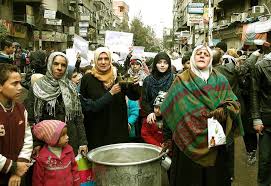Fuel crisis shuts down Syria, fans the flames of protest
The government closes government offices and agencies for two days, 11 and 18 December. Syrian authorities blame Western sanctions and the disruption of supplies. In the southern province of Sweida, two people die in a protest related to the energy crisis. Iran is boosting oil supplies, from one to three million barrels per month.
Damascus (AsiaNews) – The Syrian government plans to close all government offices and agencies on 11 and 18 December because of a serious energy crisis in a country already brought to its knees by 10 years of civil war and jihadi violence.
According to Syrian authorities, shortages are due to disruption in supplies and Western sanctions.
The situation is drying up government coffers and exacerbating the effects of the “poverty bomb”, doing more damage than the war itself. For Maronite Archbishop Samir Nassar of Damascus, this has meant a silent ordeal for an exhausted Syrian people.
The decision to shut down government offices for two, non-consecutive days, follows that paralysis of public transport, which has prevented government employees from getting to work.
In the past few weeks, fuel shortages have brought to a halt much of the area under the control of the government of President Bashar al-Assad.
Amid widespread power cuts, the crisis has affected almost all sectors, as fuel is needed to power generators that supply electricity to factories, telecom networks, and other facilities.
This crisis was one of the factors behind riots last Sunday in Sweida, a Druze-majority province in southern Syria, in which a protester and a police officer were killed and seven people wounded.
The crisis is getting particularly worse at the approaching winter, when many rely on diesel for heating. On Monday, the Ministry of Internal Trade almost doubled the price of diesel to 5,400 Syrian pounds (almost US$ 1) per litre, while petrol costs 4,900 pounds a litre.
A taxi driver in Damascus said that he worked only three days a week due to lack of fuel and government subsidies are no longer enough to cover his needs, while black-market prices are unsustainable. “I'd rather rest [than work at a loss],” he said.
Since the start of the civil war in 2011, Iran has been a key ally for Syria’s government. Last month, it decided to increase oil supplies from one million barrels a month to three million, government newspaper al-Watan reports.
Before the war, Syria produced 380,000 barrels a day, with 250,000 earmarked for domestic use and the rest for export.
At present, production has largely collapsed because the main oil fields are in the east of the country, under the control of US-backed Kurdish forces.
The Ministry of Oil and Mineral Resources says government refineries produce about 80,000 barrels a day.
“Life has become completely paralysed especially because of the diesel shortage,” said Samir Asfour, who owns a cement brick factory in the Damascus suburb of Adra.
According to the latest forecast, at least 17 million Syrians are in need, suffering from cold and hunger every day.
The sick cannot find medicines, hospitals face regular power outages and limited supplies, while parents cannot find bread and milk for their children. The situation is increasingly desperate because of the sanctions and the Caesar Act.
Shops in the capital close at sunset, because there is no fuel for generators. Private bakeries have cut production with machinery and ovens at a standstill most of the time. Restaurants are forced to serve cold or grilled food due to lack of gas.
Finally, gas for cylinders is in short supply, and even when it is found, it is of very poor quality and very high cost, which most people cannot afford.
23/07/2020 09:27







.png)










